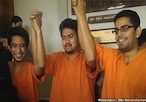Malaysian authorities must stop using vague and poorly defined laws to arrest and harass people for participating or organizing peaceful demonstrations, the ICJ said today.
The ICJ called for the repeal of Section 124B of the Penal Code, or its amendment in line with international standards.
At least 37 people have been swept up in arrests in recent days, many on 1 August at a rally organized in Kuala Lumpur by Demi Malaysia (For Malaysia) – a youth group comprised of activists from civil society groups, political parties and student organizations.
“As an immediate matter, the Malaysian government must ensure that no charges are brought against some 37 people who were arrested and detained this week for organizing a peaceful public demonstration,” said Emerlynne Gil, ICJ’s Senior International Legal Adviser on Southeast Asia. “As the government faces a wave of public criticism, it seems to be resorting to new legal mechanisms to block peaceful assembly and free expression—but these are guaranteed human rights and a crucial component of parliamentary democracy.”
At least 30 people were detained in the past few days under Section 143 of the Penal Code, which addresses “unlawful assemblies”.
Another seven people were arrested and held under Section 124B of the Penal Code, which states:
“Whoever, by any means, directly or indirectly, commits an activity detrimental to parliamentary democracy shall be punished with imprisonment for a term which may extend to twenty years.”
The seven individuals arrested under Section 124B were Adam Adli, Shukri Abdul Razab, Mandeep Singh, Safwan Anang, Hishammudin Rais, Vince Tan, and Fahmi Zainol. They were arrested before the public assembly occurred and are alleged to be involved in organizing the event.
“The use of Section 124B against people organizing a peaceful protest is particularly alarming, as the law’s language is impermissibly vague and broad, and the punishment of 20 years imprisonment is disproportionately harsh,” said Gil. “The Malaysian government must immediately move to substantially amend or repeal this problematic law, and meanwhile ensure that it is not used to charge any peaceful protesters.”
Gil further said: “An activity detrimental to parliamentary democracy’ is defined under Section 130A of the Penal Code to mean actions that are violent or unconstitutional, conditions clearly not present with this group of people arrested”.
“Section 124B has never been used before and the Malaysian government should ensure that this is never used in the future,” she added.
All 37 individuals arrested were released on police bail, except for Adam Adli, Shukri Abdul Razab, and Mandeep Singh, who were released after their lawyers successfully obtained an order from the High Court to review the order to remand them.
“Malaysia’s current political situation will likely see more public demonstrations critical of the government; it is the government’s responsibility to allow these peaceful protests to take place and to defend the rights of the protesters, not to trample on their rights,” Gil said. “Malaysia has the positive obligation under international human rights law not only to protect peaceful assemblies, but also to facilitate the exercise of the right to freedom of peaceful assembly.”
The right to freedom of peaceful assembly is guaranteed in key international human rights instruments.
The UN Human Rights Council underscored its commitment to promote and protect the right to freedom of peaceful assembly and association by adopting several resolutions on this issue, the most recent of which is Resolution 24/5, which was adopted in October 2013.
In Resolution 24/5, the UN Human Rights Council reminded States of their obligation to respect and fully protect the rights of all individuals, including human rights defenders, to assemble peacefully.
Background
On 1 August 2015, youth group Demi Malaysia (For Malaysia) organized a rally in Kuala Lumpur to call for the resignation of Malaysian Prime Minister Najib Razak for having failed to provide adequate responses on how 1Malaysia Development Berhad (1MDB), a strategic government fund, will be able to repay its debts that have amounted to billions of ringgit. Recently, Prime Minister Najib Razak has been facing allegations that he misappropriated RM 2.6 billion (USD 700 million) of 1MDB funds.
Adam Adli, Shukri Abdul Razab and Mandeep Singh were arrested and detained under s.124B of the Penal Code a day before the rally, while four others, Safwan Anang, Hishammudin Rais, Vince Tan and Fahmi Zainol were arrested and detained under the same provision on 1 August before the rally begun.
Contact
Emerlynne Gil, ICJ Senior International Legal Adviser, (Bangkok); t: +668 409 23575; e: emerlynne.gil(a)icj.org.
Photo: Zikri Kamarulzaman / Malaysiakini




